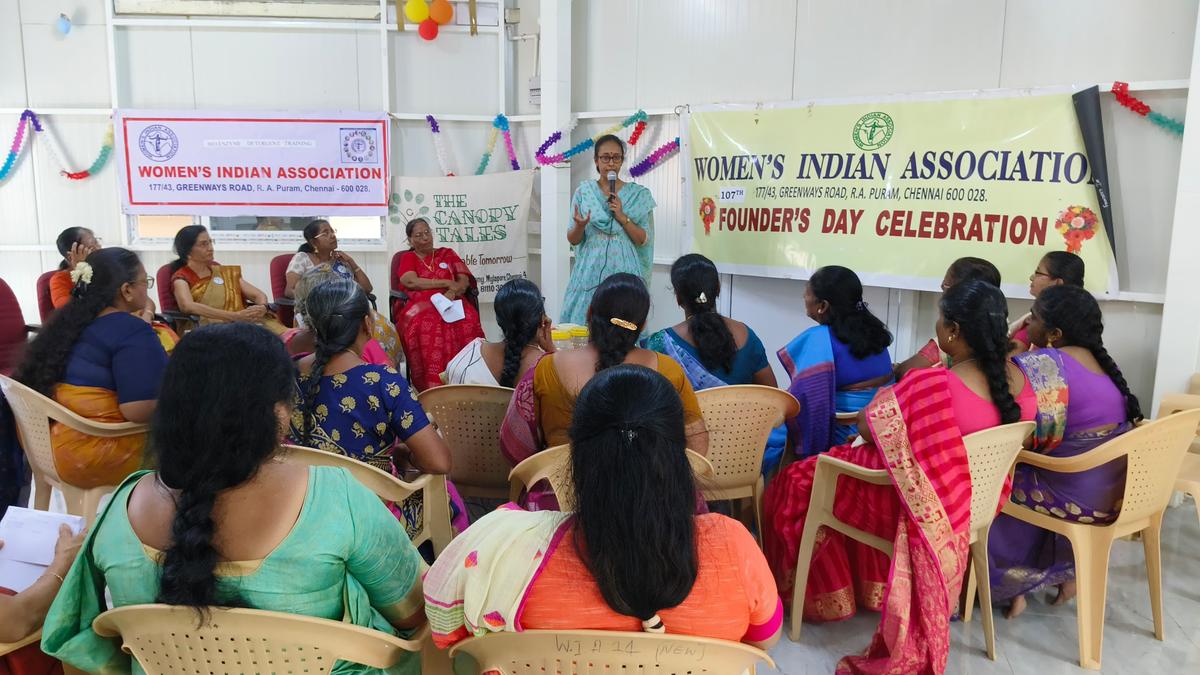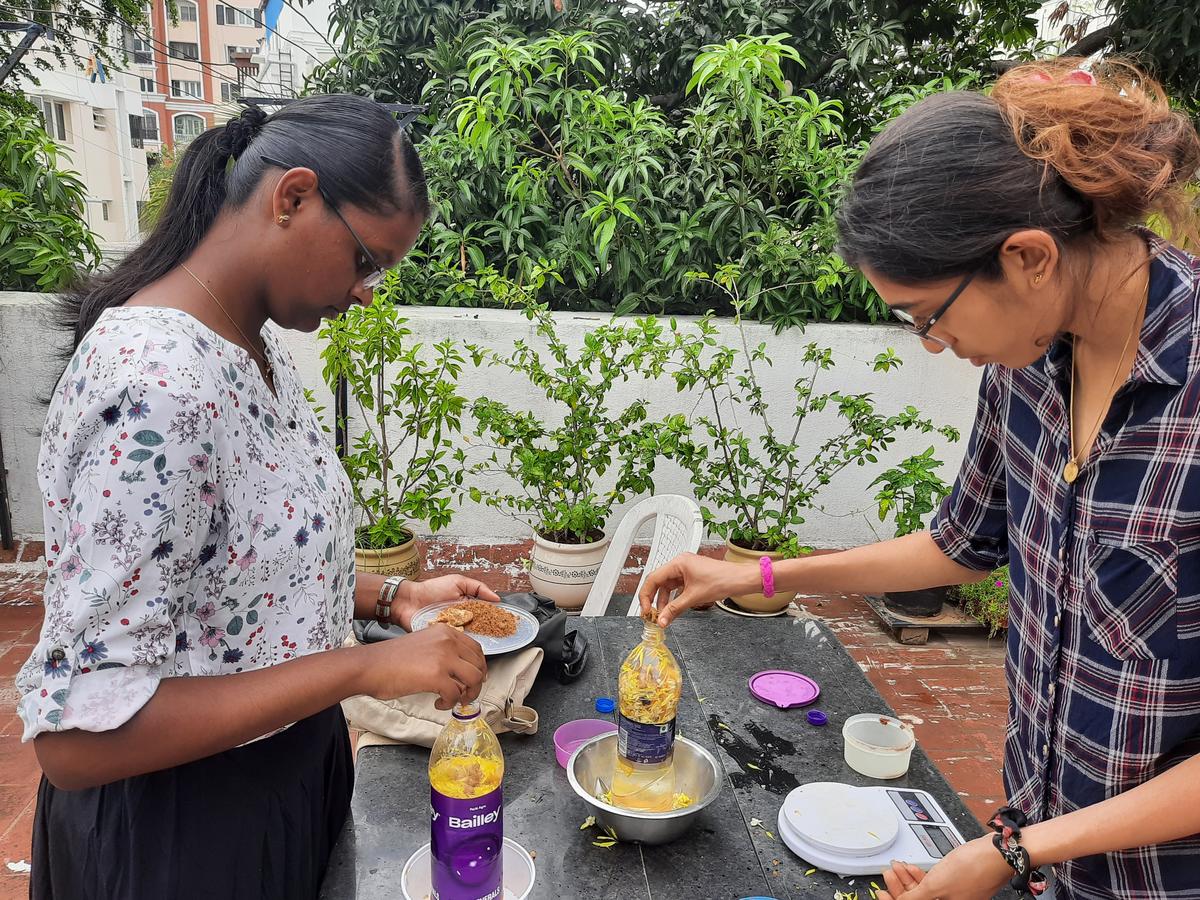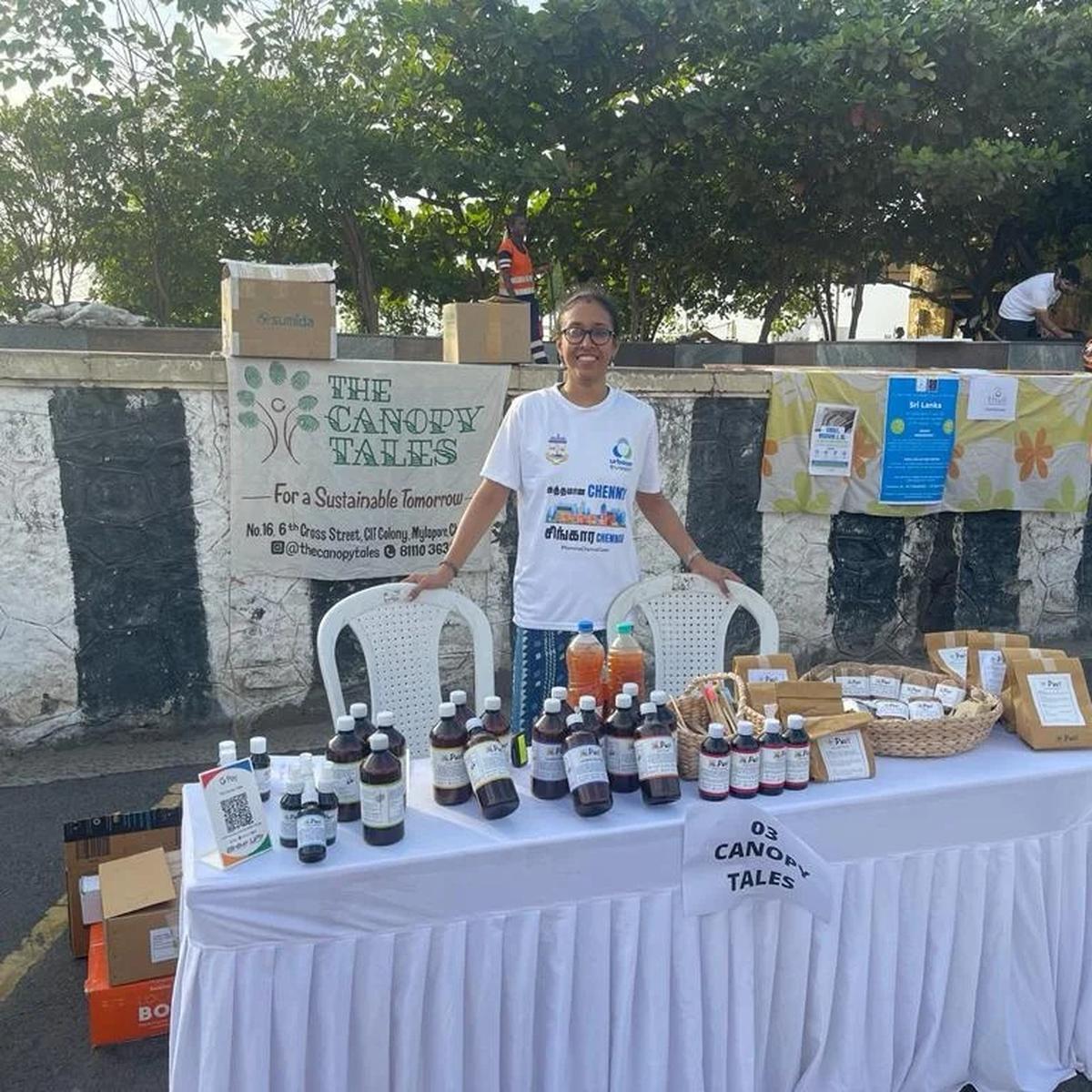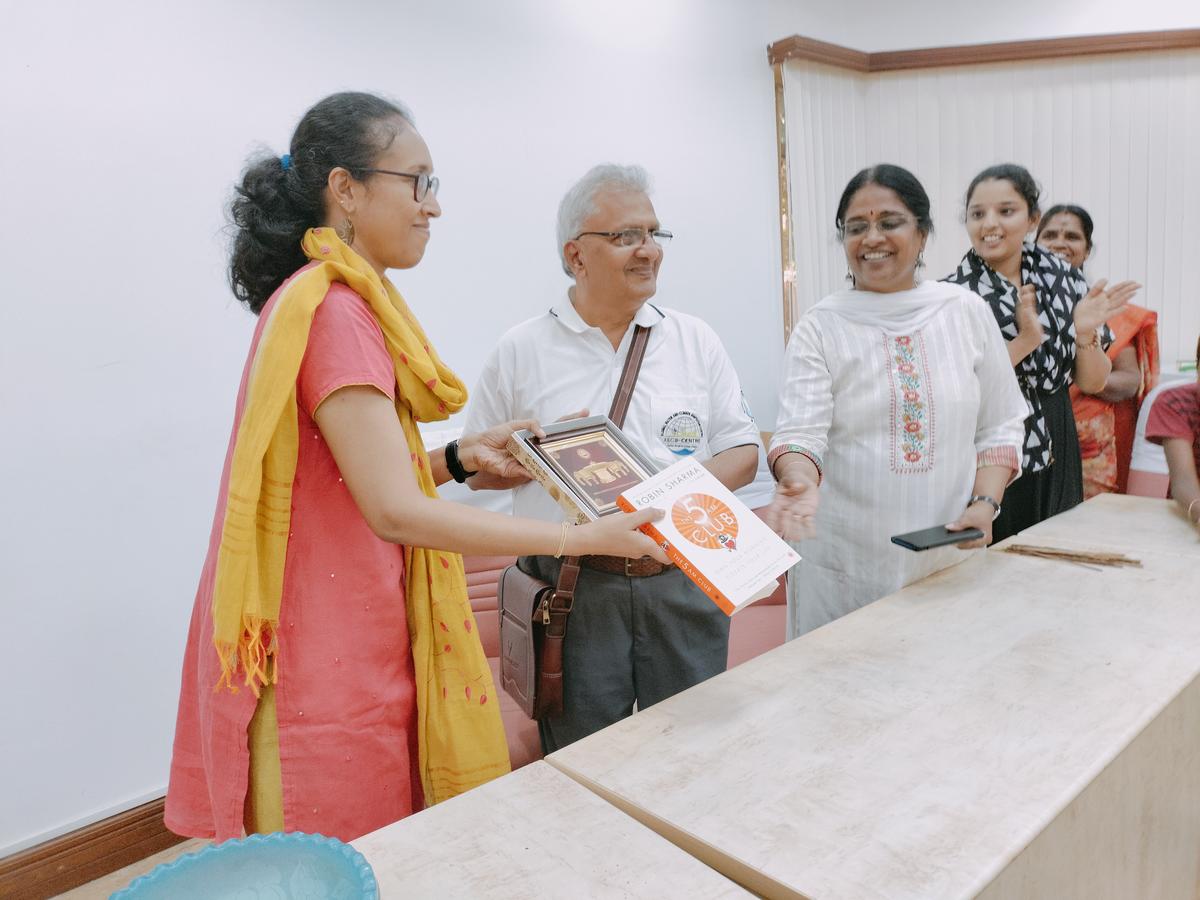In Franz Kafka’s The Metamorphosis, Gregor Samsa wakes up to an unsettling truth: he has transformed overnight into an insect, with no say in his own becoming. Neeraja Arjun’s transformation was not entirely unbidden, certainly not grotesque, but indubitably as life-shifting as Gregor Samsa’s. At CIT Colony in Mylapore, Neeraja lays up unlikely treasures — citrus peels and similar organic discards — and hobnobs with microbes, in a spirited effort to impart worth to waste; and she has hired herself as an unapologetic spokesperson for alternative organic cleaning solutions, clambering on to platforms where the message can be amplified. This picture is indeed vastly removed from the one that defined her everyday reality only a few years ago: a homemaker dabbling in sustainable practices and applying them within the closed walls of familial wellbeing.

Neeraja Arjun conducting a session at Women’s Indian Association. Photo: Special arrangement
| Photo Credit:
SPECIAL ARRANGEMENT
Neeraja dons the mantle of a bio enzyme maker and she dons it in a manner campaigners wear their ideologies. Unlike most other bio enzyme makers, she ensured early on that the activity broke out of the prison walls of her kitchen. A few years into bio enzyme-making, she kicked the activity upstairs, collaborating with a commercial bio enzyme manufacturer. She would go on to fashion her own brand, The Canopy Tales, a sustainability store. However, the most significant aspect of her work, one that steers her a whole galaxy away from DIY bio enzyme makers and even a horde of those practising it professionally is her desire to share her knowledge with women self-help groups.
Neeraja speaks on sustainability at various fora, particularly on college campuses. The road to Mylapore began in Tiruchirappalli. In the prelude to this journey, her hands were full, one cradling a newborn, the other clutching a questionnaire resulting from introspection: how does one cleanse without consequence? How does one strip away dirt without leaving behind something far worse?

Neeraja Arjun (right) of The Canopy Tales. Photo: Special arrangement
| Photo Credit:
SPECIAL ARRANGEMENT
“I just wanted a safer way to wash my child’s clothes,” Neeraja recalls. That is when she found bio enzymes and by 2017 mastered the science-art of making it through gratuitously but helpfully offered YouTube tutorials. While the world stockpiled disinfectants during the pandemic, her home was stationed in a microbial utopia, sterilised by raw life, not chemicals. It was not until 2021 that the real shift happened: when she moved to Chennai. Her research deepened, leading her to Thai botanist Dr. Rosukon Poompanvong and her mentor, Shrekanth, who is based out of Coimbatore and owns a brand that makes and promotes sustainability-related products. Their insights reinforced her faith in bio enzymes. From having seeped into her routine, bio enzyme making was now redefining it. It was defining her on the personal and professional fronts.
Educational training
A snatch of a back story would place this pursuit in perspective. Neeraja’s educational training geared towards environment-related professional practice proved a cul-de-sac, failing to take her to the promised destination. She is qualified in GIS for environmental modelling and management, which she studied in Europe on a scholarship in 2009-10. After returning to India, she found that GIS was still a nascent industry and struggled to find opportunities in the field. With marriage, she settled down in Tiruchirappalli, where she lived for nearly a decade until 2021. With localities marked by stretches of paddy fields and banana plantations, Tiruchirappalli supported her passion for organic farming. She visited many an organic farm to understand organic practices. In those years, she was unconsciously searching for her place in the sustainability ecosystem, settling on a pursuit that would help her shore it up in a small way. The unspoken desire materialised when she discovered her metier in bio enzyme making, following the move to Chennai. Everything seemed to happen on cue. She found herself racing towards the summit of Abraham Maslow’s pyramid of needs — self actualisation.
First, in only a little expenditure of time, her repertoire for bio enzyme making broadened. “I love experimenting and bio enzyme making gave me that space. I have crafted over 30 varieties of bio enzymes, some defined by known and regular raw materials such as lemon and orange peels and others by less-known, the latter list including flowers, notably marigold, Asian pigeonwings (sangupushpam) and night jasmine (parijatham).” Between them, these varieties serve three applications: as floor cleaner, laundry liquid and dishwashing liquid.
Bio enzyme making might be ruled by formulas, neatly laid down ratios of ingredients. While swearing by the science of it, Neeraja is enamoured by the craftsmanship glazing it. “I love the unpredictability of it,” she admits. “Each batch is different. Each one has its own scent, its own personality.”
In the early years when she was making bio enzymes on a reasonably sizeable scale, partly due to a collaboration with a manufacturer, she was yoked to a demanding routine. Challenges at various levels — from the production process to the pricing — had to be dealt with. Though daunting, Neeraja kept at it.
In over 5,000 sq. ft dedicated to fermentation, a large number of drums bearing bio enzyme had to be monitored, filtered and refined. The process was labour-intensive, the yield limited, and yet, she priced her products as accessible as she could. Beyond fermentation, one major cost factor was laboratory testing. “Because bio enzymes involve probiotics, they have to undergo extensive lab testing to ensure quality and safety,” she says. These tests added to the overall cost but also ensured that customers received a product that was not just environmentally friendly but also safe for their homes and families. “The margins are slim because I want more people to try bio enzymes. But I also have to be realistic. If someone expects a handcrafted product to match mass-market pricing, they’ are not seeing the full picture.”

Neeraja Arjun of The Canopy Tales. Photo: Special arrangement
| Photo Credit:
SPECIAL ARRANGEMENT
In any sustainability journey, one would come upon a molehill (if not mountain) of contradictions sooner or later. In large-scale fermentation, the very vessels that cradle these bio enzymes — the jars where transformation happens — are made of HDPE plastic. “Glass and aluminium would be ideal,” she acknowledges, “but they are impractical for large-scale fermentation. The solution is not about demonising plastic but using it wisely.” This, she believes, is the essence of sustainable living — not a rigid doctrine, but a practice of making conscious, balanced choices.
Knowledge sharing
Environmentalism would be sustainable in the deepest sense of the term only if it heals social wounds, in small but significant ways, Neeraja makes sure it does. She offers the how-to of bio enzyme making to women self-help groups. In this context, she is associated with Women’s Indian Association (WIA), conducting regular sessions on bio enzyme making for the women whose lives the organisation is trying to improve. “The real magic is not just in the jars, but in the people who learn to make them,” she says. In a village near Mahabalipuram, she trained a self-help group of 20-30 women, passing on to them what she had learned. she left the session wiser by a new bio enzyme-making trick she picked up on account of it.

Neeraja Arjun at the inauguration of IIT’s Sustainability Department. Photo: Special arrangement
| Photo Credit:
SPECIAL ARRANGEMENT
At the end of the session, one woman hesitated before asking, “Can we make bio enzymes from cashew fruit?” Neeraja had never heard of anyone trying their hand at this. The woman explained that cashew-processing industries in the area discarded vast quantities of the fruit, treating it as waste. Intrigued, Neeraja took some home and let it ferment. Three months later, the results were astonishing — better than citrus peels. “That is when I learned innovation is sometimes just about paying attention.”
Published – February 15, 2025 11:46 am IST








